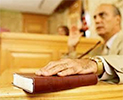Journal Detail back to listing

High Court revokes permission to rely on expert evidence
- Aug 11, 2022
- Latest Journal
The High Court has provided guidance on the obligations of an expert witness to act independently in compliance with CPR Part 35.
Patricia Andrews & Ors v Kronospan Limited [2022] EWHC 479 (QB)
The Chirk Nuisance Group Litigation
The judgment addressed the decisions in BDW Trading Ltd v Integral [2018] EWHC 1915 (TCC) and Dana UK Axle Limited [2021] EWHC 1413 (TCC) where experts had breached Part 35 by engaging in conduct contrary to the rule.
In this instance, the Claimants’ expert had conferred with and sought opinions from the Claimants’ solicitors on issues relevant to ongoing joint expert discussions and the joint statement, which was conceded by the Claimants’ representatives as amounting to a serious transgression. The court was therefore concerned with the extent of the transgressions and the sanction to be applied.
Clyde & Co represented the Defendant.
Background
The Chirk Nuisance Group Litigation involves claims by multiple Claimants who allege that the Defendant is liable to them in public or private nuisance by reason of dust, noise or odour emissions as a result of the management or operation of the site of the Defendant’s wood processing and wood product manufacturing plant. Liability is denied.
The parties had permission to rely on experts in the disciplines of dust dispersion modelling and dust analysis. Correspondence between the parties’ legal representatives indicated a likelihood that the Claimants’ expert had been in communication with the Claimants' solicitors during the joint statement process in respect of dust analysis. Disclosure of this communication revealed an ongoing dialogue including the exchange of draft versions of the joint statement between the expert and Claimants' solicitors and advice and suggestions by the solicitors as to the content.
Following this disclosure, Clyde & Co applied to revoke the Claimants’ permission to rely on their expert in dust analysis and dust modelling. The application was heard before Senior Master Fontaine.
Hearing
The Defendant submitted that the conduct of the Claimants’ expert demonstrated that he was not truly independent but instead had acted as an advocate for the Claimants. His conduct, and that of the Claimants’ solicitors amounted to a failure to comply with the terms upon which the Claimants were given permission to adduce their expert evidence.
The Claimants’ solicitors accepted that they had made at least 16 comments relating to “advice and suggestions as to content”, and that there had been “serious transgressions”. However, they submitted that their expert had only changed his position once as a result of this communication. The Claimants argued that it would be disproportionate and potentially disastrous to their claims to not allow them to rely on their expert evidence. In addition, revoking permission would lead to significant additional costs and a significant delay whilst a replacement expert was found.
Judgment
The Senior Master concluded, in terms, that the serious transgressions by the expert and the Claimants’ solicitors are such that the court has no confidence in the expert’s ability to act in accordance with his obligations as an expert witness. In the circumstances, it is appropriate to revoke permission.
The Senior Master observed that:
"It is important that the integrity of the expert discussion process is preserved so that the court, and the public, can have confidence that the court’s decisions are made on the basis of objective expert evidence."
The issue as to whether newly appointed experts should be permitted was also considered with the Senior Master ruling that this was appropriate whilst recognising the delay and costs ramifications of this.
Implications
The judgment provides a helpful review of the rules and authorities in circumstances where experts have been in contact with legal representatives during the joint statement process. As in BDW, this should only be in exceptional circumstances and should be done openly otherwise it is a serious transgression.
The appropriate sanction to be applied will be fact sensitive but what is clear is that when the joint statement process is underway, any expert that is communicating with the solicitors regarding the form and content of the draft joint statement risks being excluded.
In this case, when considering the sanction, the Senior Master had regard not only to the conduct of the expert (paragraph 31) but also the failure of the Claimants’ solicitors to reveal the full extent of their communication with the expert until pressed to do so. Of critical importance to the success of the application was the persistence in unearthing the complete facts as summarised in paragraphs 27 to 29.
Authors:
Lucy Miemczyk - Associate
Hugh Mullins - Partner
www.clydeco.com
